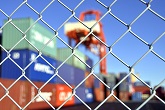The pre-Holloween explosion of a fully loaded outbound container at a Port of Los Angeles terminal was a scary incident for a number of reasons, say shipping analysts.
The one recurrent nightmare for shipping security experts has long been the possibility of a weaponized container entering the nation’s largest port to wreak havoc and destruction. But the fact that the recent explosion at an LA Port Terminal was caused by a container loaded in the U.S. and destined for an export market may now have an impact on new protocols for outbound inspection and diligence.
At 5:58 p.m. on October 30th, 2018, the Los Angeles Port Police received a call regarding a container explosion at a Port of Los Angeles container terminal. Unified Command was established with the Los Angeles Port Police, Los Angeles Police Department, Los Angeles Fire Department, U.S. Coast Guard, Customs and Border Protection, FBI, container terminal management and ILWU Labor representatives.
The investigation determined that a 40-foot container was delivered earlier in the day along with 11 other containers from a recycling facility on Terminal Island. The containers were slated for delivery to Taiwan.
“Because our facilitation of a safe and secure supply chain is top priority at the Port of Los Angeles, the incident involving an export-bound shipping container that exploded inside a marine terminal storage area here on October 30 is of paramount concern to the Los Angeles Harbor Department and Los Angeles Port Police,” stated port spokesmen.
Preliminary analysis by the Los Angeles Port Police Hazardous Materials Unit, Los Angeles Police Department Bomb Squad and United States Coast Guard indicates that a form of combustible fuel or other compound was ignited in the sealed container. A thorough investigation continues.
The results of this investigation and recommendations will be reported back to the Board of Harbor Commissioners and the public.
Meanwhile, it will be interesting to see how other U.S. port authorities react to this episode, which could have been far more serious if lives had been lost.
www.supplychain247.com













